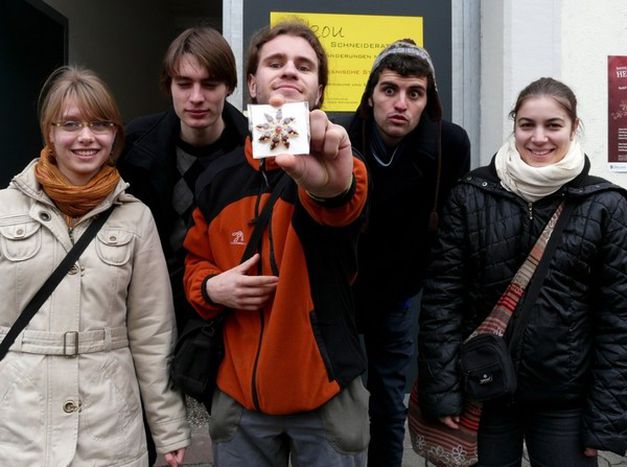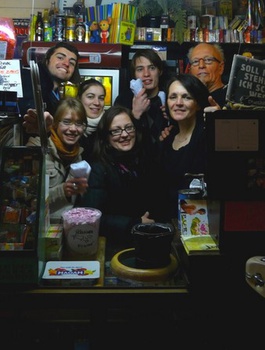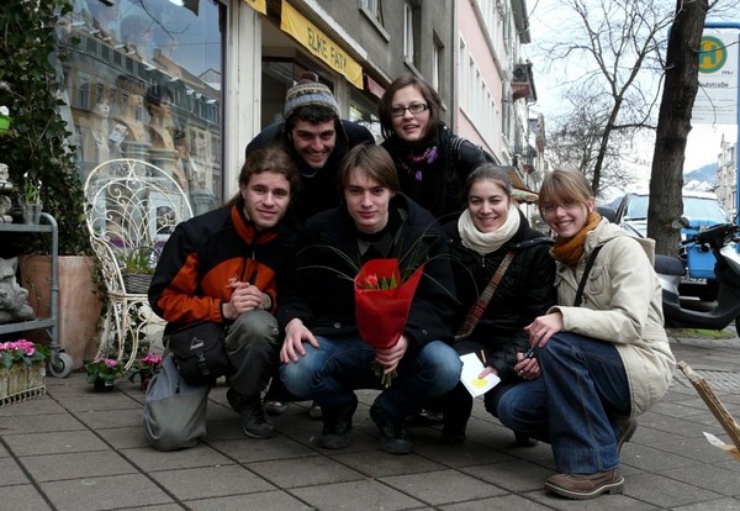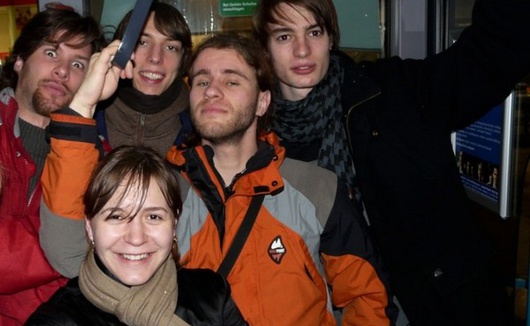
'Eurogeneration' go to the polls
Published on
Translation by:
 Andrew Christie
Andrew Christie
'Europe is a massive thing'. Yet its counterpart, the European Union, is often dull. During the European elections between 4 and 7 June 2009, a crucial vote for European democracy, we ask whether young people on European voluntary service (EVS) and Erasmus programmes in Germany feel it affects them
Enthusiasm across the board: the European scheme is Truly A Good Thing. The young people currently profiting from EU exchange programmes, from member and non-member states alike, are all interested in the old continent, although some freely admit they don’t attach a great deal of importance to it. But then not everyone is passionate about politics.
'From Polish vodka right through to ancient Greek temples and French fondue, I’m proud to be European'
For them, Europe undoubtedly opens a world of possibilities: to travel, encounter new cultures and build up a network of new friends abroad. Chris McNulty, an English volunteer in Munich, says: 'I’m proud to be European. From Polish vodka right through to ancient Greek temples and French fondue, I feel a connection to all this rich culture.' But just how many will take part in June’s elections?
All citizens, or almost
 The vast majority of the young people here with me say they will vote. Some even claim they won’t miss the elections under any circumstances. 'My country has benefited hugely from the support of the EU; I’m a European citizen,' explains Fabiana, a Spanish girl staying in Giessen. Karsten Gödderz, a German student in Bonn, says he will vote because the partisans of the monarchist right (the unofficial heirs to the Nazi throne) won’t forget to. 'It is important to take part in the politics of the European Union in order to pursue the goal of its founders: to pacify Europe after the second world war. We have stopped quarrelling and are now working on common projects,' adds Kei, a German student in Freiburg.
The vast majority of the young people here with me say they will vote. Some even claim they won’t miss the elections under any circumstances. 'My country has benefited hugely from the support of the EU; I’m a European citizen,' explains Fabiana, a Spanish girl staying in Giessen. Karsten Gödderz, a German student in Bonn, says he will vote because the partisans of the monarchist right (the unofficial heirs to the Nazi throne) won’t forget to. 'It is important to take part in the politics of the European Union in order to pursue the goal of its founders: to pacify Europe after the second world war. We have stopped quarrelling and are now working on common projects,' adds Kei, a German student in Freiburg.
But then there are those who won’t vote, either because they have no interest in politics or because they are put off by the bureaucracy. Also, national pride is very strong among us citizens, and it is this which lends Europe its richness: every culture has its place in the EU. Another important point is the poor communication of information, for example the fact that many people are not aware of the elections in June. 'I came across things that were very well organised by the EU, like the EVS, and exchange seminars, but they are not discussed enough in France. I think it’s a shame,' says Blandine Jung, a French volunteer in Görlitz.

Where are Europe’s borders?
'One morning, I saw a Roma family eating in a park,' says Rūta Vimba, a Latvian volunteer in Berlin. They were surrounded by police watching every move they made. These prejudiced people never cease to amaze me. It’s as if the EU finishes where eastern Europe begins.' Political borders, geographical borders, and some think cultural borders. 'Europe remains too inaccessible to non-Europeans. It’s even more difficult when their country of origin is poor, and likewise their social standing. I hope Europe will grow by being considerate of these people, without becoming a centre of power, which in my opinion could get enormous and dangerous,' adds Alfonso Gallo Bueno, a Spanish erasmus student in Tromsø, Norway. In any case, whether you think Europe is 'between Russia and America,' 'from the Urals to the Mediterranean' or 'around Switzerland, from Norway to Turkey', the centre of Europe still hasn’t been definitively pinpointed. It is a matter for debate.
Erasmus and EVS: opportunities!
 Paul Mede, a former volunteer in Europe, now hosts seminars in Germany, his native country. 'I believe it’s very important to make a clear distinction between Europe and the EU. There is a common tendency to confuse the two. Europe is a massive thing for me, whereas I am able to criticise the EU despite the many good things that happen there.'
Paul Mede, a former volunteer in Europe, now hosts seminars in Germany, his native country. 'I believe it’s very important to make a clear distinction between Europe and the EU. There is a common tendency to confuse the two. Europe is a massive thing for me, whereas I am able to criticise the EU despite the many good things that happen there.'
Hugo Bouquin, a French volunteer in Nuremberg, is discovering his identity as a European as he discovers Germany. He shares a widely held opinion. 'Programmes like the EVS and Erasmus are there for young people from different countries to meet one another, understand one another and form a group presence for Europe. They also help to destroy clichés, laugh at differences and reinforce individual cultures with other countries’ plus points. These programmes give Europe a real constructive impetus – each one of us adds our brick to the building.'
Translated from L’eurogénération à l’épreuve des urnes


